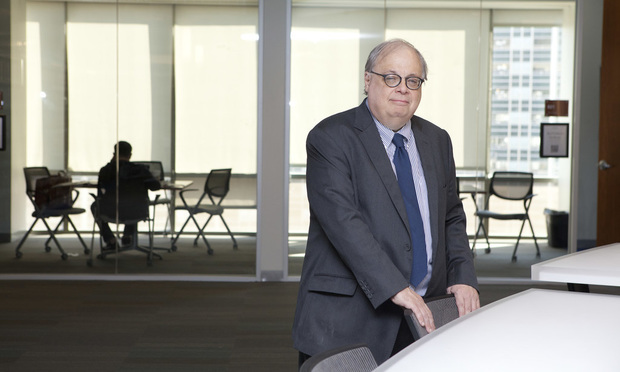Work Matters: Busting Myths Before They Bust Your Case
Here are seven litigation myths that too often hold us hostage because they sound so reasonable, so intuitive and, well, so safe.
September 30, 2019 at 03:00 PM
6 minute read
 Michael P. Maslanka
Michael P. Maslanka
It's not what we don't know that hurts us but rather what we think is so that isn't. Here are seven litigation myths that too often hold us hostage because they sound so reasonable, so intuitive and, well, so safe.
Myth No. 1: 'But the Judge will get mad!'
In class I draw a square, write inside it a fictional caption and case number, and sketch a seal. I ask: What is this? The answer: The Record the Alpha and the Omega of a trial lawyer. It must be protected. Yes, a Judge might get irritated if we request a ruling or seek mandamus. But a Judge out of sorts because we are honoring our oath is a judge predisposed to be upset over anything. Soldier on!
Myth No. 2: 'We need an ideal juror profile'
The key to jury selection is to root out and strike your enemies, not to identify and bond with your friends. Voir dire only allows time for a quick take on the first, not unlike speed dating. (Not that I know anything about that!) By the way, your enemies will self-identify. Is the potential juror a little too anxious to serve? Mouthing all the right words, yet slouching in their chair? Also follow the advice of a friend in Austin: Always strike a potential juror that sounds like a "leader". You never really know the direction in which the juror will lead until the verdict is returned. Juror selection requires a sickle, not a scalpel.
Myth No. 3: 'Birds of a feather always flock together.'
This barroom generality is wrong. Hypo 1: Black plaintiff claims race discrimination in his termination; liability facts are strong; punitive damages a real possibility. You are the defense lawyer. You are down to your last strike. Do you strike a white juror, early 40s, laid off several times from corporate America or a black juror, mid 60s, working the same job the past 24 years? The first because work place trauma makes awarding significant punishment more likely. Displaced anger is all too real. Hypo 2: Key witness is a professional, whether human resources or law enforcement or mid-level manager. Think seriously about striking the juror professional who may be hyper critical of the witness professional ("Well, I wouldn't have handled it that way!") Hypo 3: Female litigant and female juror. Female juror presumptively favors a female? Think again. Evolutionary biology trumps a #MeToo culture, at least I believe in the view of the authors of "In the Company of Women: Indirect Aggression Among Women: Why We Hurt Each Other and How to Stop." Their Big Idea: Women hammer other women they consider to have a bee in their bonnet (i.e., act superior). Swim against the tide.
Myth No. 4: Settlement Good; Litigation Bad
The "Me Tarzan/You Jane" starkness is apt given the pernicious notion that lawyers, to be professionals, must be peacemakers and not warriors. Just as no two people are ever equally in love, so too no two litigants are ever evenly matched. One side inevitably is dealt better facts, stronger narratives, deeper resources. These litigants should get the deal they desire. This timeless truth is now being derailed by the clueless but well-meaning (books like "Getting To Yes"); the cautious but well-motivated (their memoir would be "Forty Years a Conference Call Lawyer"); the well-"schooled" but poorly "educated" (Gen Z lawyers). Learn instead the joys of saying "no". Watch the scene in The Godfather Part II in which a United States Senator tries to shake down Michael Corleone, giving him 24 hours to accept a bad deal. Corleone quietly remarks: "You can have my answer now Senator. My answer is no." Classic. Or read "Start With No" by Jim Camp and learn that saying "no" is ethical because then everyone knows where they stand. Clarity good; confusion bad.
Myth No. 5: Humanize Yourself to the Jury
In trial, we are conduits, not ringmasters. Here is an "Assorted Sampler of Misplaced Egos" (Free Shipping) from 38 years of practice: Voir dire in central Texas "when I am not dressed up in a suit I am wearing blue jeans, driving my tractor and plowing my fields"; closing argument in Dallas, "Because this morning is the first day of school, I walked my daughter to her school. Priorities are important." Direct examination in Harris County," ever since I became a mother last year, I have (blah, blah, blah) "which was then followed by a question Jurors do not care. They know: (a) you want their vote and (b) you two will not be lunching at the club next weekend. Focus on their humanity and that of your client. Forget yourself.
Myth No. 6: The Fifth Circuit Will Fix It
Here is the dream: Lawyers for plaintiffs and defendants each embrace the myth that "justice" not meted out in the trial court will be done if they draw an ideologically favorable panel. Here is the reality: An appeals court is not a vending machine—tap in N5 and out comes a reversed and rendered, or A7 and out slides an affirmance of damages. Differences are seldom ideological but rather more often nuanced, such as the proper application of precedent. As I tell students, standards of review operate as legal speed bumps to stop judges from honoring their personal preferences over their solemn oaths. Don't be like the pick -up artist who uses the same bad line that worked once hoping for the same result. Lightening never strikes twice.
Myth No. 7: Be Perfect
Ditch perfection. It ain't happening. Instead seek a goal that is achievable, doable, and real; namely, being solid. (Read about this insight "10½ Things No Commencement Speaker Has Ever Said" by Charles Wheelan.) Know why the Japanese lost at Midway? Because two of their carriers were not in perfect shape, they were left in anchorage. So, instead of six enemy carriers versus our three, there were four versus three. That difference made all the difference. A lesson when next racing to obtain a TRO.
We cling to our myths do we not? I do. Auden understood: "We would rather be ruined than changed … and let our illusions die." Always reject what is not working in favor of what will. Adapt.
Michael P. Maslanka is an assistant professor of law at UNT Dallas College of Law.
This content has been archived. It is available through our partners, LexisNexis® and Bloomberg Law.
To view this content, please continue to their sites.
Not a Lexis Subscriber?
Subscribe Now
Not a Bloomberg Law Subscriber?
Subscribe Now
NOT FOR REPRINT
© 2025 ALM Global, LLC, All Rights Reserved. Request academic re-use from www.copyright.com. All other uses, submit a request to [email protected]. For more information visit Asset & Logo Licensing.
You Might Like
View All
From Hospital Bed to Legal Insights: Lessons in Life, Law, and Lawyering
6 minute read

Nondisparagement Clauses in Divorce: Balancing Family Harmony and Free Speech
6 minute readTrending Stories
- 1CFPB Labor Union Files Twin Lawsuits Seeking to Prevent Agency's Closure
- 2Crypto Crime Down, Hacks Up: Lawyers Warned of 2025 Security Shake-Up
- 3Atlanta Calling: National Law Firms Flock to a ‘Hotbed for Talented Lawyers’
- 4Privacy Suit Targets Education Department Over Disclosure of Student Financial Data to DOGE
- 5Colwell Law Group Founder Has Died in Skiing Accident
Who Got The Work
J. Brugh Lower of Gibbons has entered an appearance for industrial equipment supplier Devco Corporation in a pending trademark infringement lawsuit. The suit, accusing the defendant of selling knock-off Graco products, was filed Dec. 18 in New Jersey District Court by Rivkin Radler on behalf of Graco Inc. and Graco Minnesota. The case, assigned to U.S. District Judge Zahid N. Quraishi, is 3:24-cv-11294, Graco Inc. et al v. Devco Corporation.
Who Got The Work
Rebecca Maller-Stein and Kent A. Yalowitz of Arnold & Porter Kaye Scholer have entered their appearances for Hanaco Venture Capital and its executives, Lior Prosor and David Frankel, in a pending securities lawsuit. The action, filed on Dec. 24 in New York Southern District Court by Zell, Aron & Co. on behalf of Goldeneye Advisors, accuses the defendants of negligently and fraudulently managing the plaintiff's $1 million investment. The case, assigned to U.S. District Judge Vernon S. Broderick, is 1:24-cv-09918, Goldeneye Advisors, LLC v. Hanaco Venture Capital, Ltd. et al.
Who Got The Work
Attorneys from A&O Shearman has stepped in as defense counsel for Toronto-Dominion Bank and other defendants in a pending securities class action. The suit, filed Dec. 11 in New York Southern District Court by Bleichmar Fonti & Auld, accuses the defendants of concealing the bank's 'pervasive' deficiencies in regards to its compliance with the Bank Secrecy Act and the quality of its anti-money laundering controls. The case, assigned to U.S. District Judge Arun Subramanian, is 1:24-cv-09445, Gonzalez v. The Toronto-Dominion Bank et al.
Who Got The Work
Crown Castle International, a Pennsylvania company providing shared communications infrastructure, has turned to Luke D. Wolf of Gordon Rees Scully Mansukhani to fend off a pending breach-of-contract lawsuit. The court action, filed Nov. 25 in Michigan Eastern District Court by Hooper Hathaway PC on behalf of The Town Residences LLC, accuses Crown Castle of failing to transfer approximately $30,000 in utility payments from T-Mobile in breach of a roof-top lease and assignment agreement. The case, assigned to U.S. District Judge Susan K. Declercq, is 2:24-cv-13131, The Town Residences LLC v. T-Mobile US, Inc. et al.
Who Got The Work
Wilfred P. Coronato and Daniel M. Schwartz of McCarter & English have stepped in as defense counsel to Electrolux Home Products Inc. in a pending product liability lawsuit. The court action, filed Nov. 26 in New York Eastern District Court by Poulos Lopiccolo PC and Nagel Rice LLP on behalf of David Stern, alleges that the defendant's refrigerators’ drawers and shelving repeatedly break and fall apart within months after purchase. The case, assigned to U.S. District Judge Joan M. Azrack, is 2:24-cv-08204, Stern v. Electrolux Home Products, Inc.
Featured Firms
Law Offices of Gary Martin Hays & Associates, P.C.
(470) 294-1674
Law Offices of Mark E. Salomone
(857) 444-6468
Smith & Hassler
(713) 739-1250







